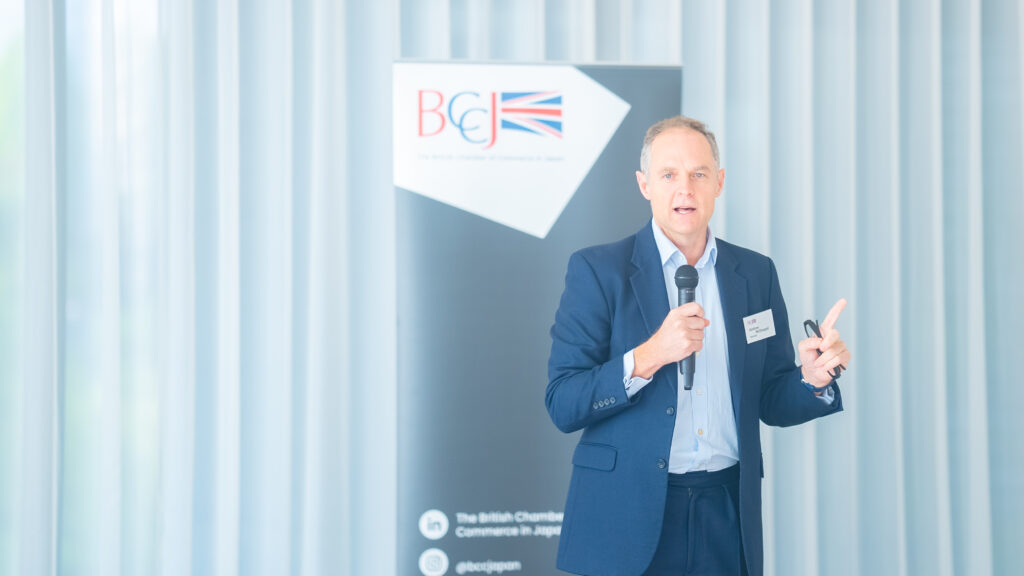Member? Please login
Global perceptions 2023: How 18–34-year-olds see the UK and the world

Written by Sterling Content
March 15, 2024
Past Event Round Ups
Soft power, the ability to shape the preferences of others through appeal and attraction—particularly through the use of culture, values and ideas—has been of increasing importance in recent years. And amid growing global competition, in these times of complex global challenges such as climate change, the measurement of a nation’s brand strength will long continue to matter.
Described as a “soft power superpower,” the UK continues to be seen by young people, including Japanese, as one of the most trusted states in the Group of 20 (G20), although maintaining this high ranking could prove challenging, according to a recent British Council report, “Global Perceptions 2023: How 18-34 year olds see the UK and the world.”
Matthew Knowles, director of the British Council in Japan, examined the findings of the report at a British Chamber of Commerce in Japan (BCCJ) event. He was joined by Mona Lotten, head of soft power research and insight at the British Council. The non-profit organisation is incorporated by Royal Charter and works to build connections and trust between people in the UK and worldwide.
The UK and the world
The report found the UK enjoys a strong position relative to its rivals; it is seen as “a more positive influence in the world than any other G20 state.”
However, the increased competition for influence is seen in the UK’s recent loss of the rank of “most attractive country in the G20” to Italy after coming first in the previous two surveys. Japan ranked fourth behind Canada, with just six points separating first and seventh place.
The UK shared second place with Japan in terms of trust in people, just a point behind Canada, with the overall trend showing the UK poised to gain top spot in the G20.
Significantly, British Council research has found that “those who trust the UK are roughly twice as likely to want to do business or trade, study, experience UK arts or culture or visit as a tourist.”
The UK again trailed only Canada in “trust in government,” with Japan placed fourth, the report found. However, the UK was top in “trust in institutions” such as the media, police and justice system, while Japan ranked third.
In terms of global influence, the UK held the top spot ahead of Japan and the USA, although the longer-term outlook is for this category to become “even more competitive.”
“It’s quite a steady and positive picture, with the rankings either staying the same or going up [over time], particularly the trust in people metric,” Lotten said.
Importantly for the British education sector, the UK ranked second behind the United States as an attractive destination for study.
The report also placed the UK third in its attractiveness for doing business, while the UK shared the fourth spot with Australia in its attractiveness as a destination for tourists.
According to the report, 14% of those surveyed wanted to visit the UK. France performed similarly while Japan was placed top, becoming the most sought-after destination.
Asked about familiarity with other countries, respondents gave answers that placed the UK fourth overall.
The UK and Japan
The report found high regard for the UK in Japan; the approximately 1,000 Japanese youth surveyed placed the UK second behind the USA in its overall attractiveness as a country. The group also gave the UK the same rank for “trust in government” and global influence.
Japanese respondents reported knowing about London but awareness of other parts of the country was lacking in comparison, prompting the report to note that the UK needs to promote places other than its traditional tourist hotspots.
“Young people in Japan don’t have a big enough map of the UK … It’s in all of our interests to build a wider understanding of the UK as a rich and diverse nation,” Knowles said.
Knowles said the UK and Japan “have a strong sense of affinity in terms of values,” with young people from both countries valuing peace, equality, freedom and sustainability.
Japanese respondents placed the UK first in terms of arts and cultural institutions, a factor that Knowles said would influence the UK’s “strong cultural programme” for Expo 2025, which will be held in Osaka over April–October 2025.
Conversely, Japan has gained an extremely favourable view in the UK, with young Brits seeing the Asian nation as “the most popular country that they want to visit,” Knowles said.
Asked about trends, Knowles said the outlook for UK–Japan ties “is really positive in terms of attraction and trust.”
Lotten said while sentiment was “really positive” between the UK and Japan, “people’s ability to engage is much lower,” due to factors such as distance and language. Knowles therefore stressed the importance of building pathways for future study and work.
“There’s a nice progression from someone coming as a tourist for a short length of time, then wanting to come back [and study] … then you have a professional network to build on through your business career. So it’s about making sure those pathways are in place for the future,” he said.
Tapping potential
While Japanese awareness of the UK is often “quite traditional” such as perceptions of the royal family and sporting events, Knowles said the British Council is trying to “refresh people’s understanding of the UK” by introducing more contemporary events that spotlight UK innovation.
“We tried to shine a very bright light on Heatherwick Studio’s contribution to the new Azabudai Hills development [in Tokyo] as a more contemporary face of UK-Japan collaboration,” he said, citing the London-based award-winning design and architecture studio.
“We were very proud to bring a creative robotics installation to Ueno Park during the Tokyo Olympics and Paralympics, as it spoke of not just the respect our two countries have for each other, but the way in which cutting-edge programming can bring a traditional Japanese artform to life,” he added.
An attendee raised the importance of UK retail brands such as Dyson and Paul Smith for showcasing UK innovation among Japanese consumers. Similarly, highlighting the multicultural nature of modern UK society could also help build bridges, particularly among non-English speaking communities, another added.
Knowles encouraged the audience to continue flying the flag for the UK’s soft power in Japan.
“Every single BCCJ member is playing a part to build trust, to court long-term relationships, to find new ways of collaborating,” he said.







